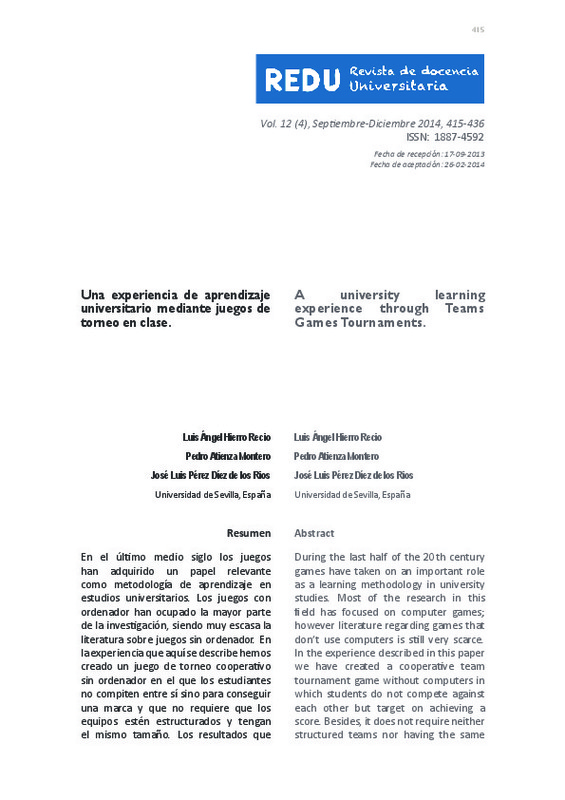Albi, E., González-Páramo, J. M. y Zubiri, I. (2009). Economía Pública I: Fundamentos, Presupuesto y Gasto, Aspectos macroeconómicos. Madrid: Editorial Ariel.
Andreu, L. y Sanz, M. (2010). El juego-concurso de De Vries: Una propuesta para la formación en competencias de trabajo en equipo en la evaluación. Revista de Docencia Universitaria, 8 (1), 121-141.
Ashraf, M. (2004). A Critical Look at the Use of Group Projects as a Pedagogical Tool. Journal of Education for Business, 79 (4), 213-216.
[+]
Albi, E., González-Páramo, J. M. y Zubiri, I. (2009). Economía Pública I: Fundamentos, Presupuesto y Gasto, Aspectos macroeconómicos. Madrid: Editorial Ariel.
Andreu, L. y Sanz, M. (2010). El juego-concurso de De Vries: Una propuesta para la formación en competencias de trabajo en equipo en la evaluación. Revista de Docencia Universitaria, 8 (1), 121-141.
Ashraf, M. (2004). A Critical Look at the Use of Group Projects as a Pedagogical Tool. Journal of Education for Business, 79 (4), 213-216.
Chen, Z-H., Chou, C-Y., Biswas, G. y Chan, T-W. (2012). Substitutive competition: Virtual pets as competitive buffers to alleviate possible negative influence on pupils. British Journal of Educational Technology, 43 (2), 247-258.
Cohen, E. G. (1994). Restructuring the classroom: conditions for productive small groups. Review of Educational Research, 64 (1), 1-35.
Cooper, N. (1978). But it doesn't really happen lake that: a look at business games in management training. En McAleese, R. (ed.) (1978). Perspectives on academic gaming and simulation 3. Training and professional education, London: Kogan Page.
Deeter-Schmelz, D.R., Kennedy, K.N. y Ramsey, R.P. (2002). Enriching Our Understanding of Student Team Effectiveness. Journal of Marketing Education, 24 (2), 114-124.
DeVries, D.L. y Slavin, R.E. (1978). Team-Games-Tournament (TGT): Review of ten classroom experiments. Journal of Research and Development in Education,12, 28-38.
Febey, K. y Coyne, M (2007). Program Evaluation: The board game. American Journal of Evaluation, 28 (1), 91-101.
Garris, R., Ahlers R. y Driskell J.E. (2002). Games, Motivation, and Learning: A Research and Practice Model. Simulation and Gaming, 33 (4), 441-467.
Greenbalt, C. S. (1981). Basic concepts and linkages. En Greenbalt, C. S. y Duke, R. D. (eds.), Principles and practices of gaming-simulation, (pp. 19-24). Beverly Hills CA, Sage Publications.
Greenbalt, C. S. y Duke, R. D. (eds.) (1981). Principles and practices of gaming-simulation. Beverly Hills CA, Sage Publications.
Hays, R.T. (2005). The effectiveness of instructional games: a literature review and discussion. Naval Air Warfare Center Training Systems Division, Technical Report 2005-004.
http://www.dtic.mil/cgi-bin/GetTRDoc?AD=ADA441935%26Location= U2%26doc=GetTRDoc.pdf
Johnson, D. W., Johnson R. T. y Stanne, M. B. (2000). Cooperative learning methods: a meta-analysis. http://www.tablelearning.com/uploads/File/EXHIBIT-B.pdf.
Johnson, D.W. y Johnson, R.T, (1994). Learning together and alone: cooperative, competitive and individualistic learning. Boston, MA: Allyn & Bacon.
Johnston, T. (2005). Roles And Responsibilities In Team Projects. Journal of College Teaching & Learning, 2 (12), 247-258.
Joyce, W. (1999). On the Free-Rider problem in cooperative learning. Journal of Education for Business, 74 (5), 271-274.
Katzenbach, J.R. y Smith, D.K. (1993). The Wisdom of Teams: Creating the High-Performance, McKinsey and Company, Inc.: New York
Ke, F. y Grabowski, B. (2007). Gameplaying for maths learning: cooperative or not?. British Journal of Educational Technology, 38 (2), 249-259.
Kiili, K. (2007). Foundation for problem-based gaming. British Journal of Educational Technology, 38 (3), 394-404.
Leemkuil, H., De Jong, T. y Ootes S. (2000). Review of educational use of games and simulations. Knowledge management Interactive Training System Program, D1, University of Twente. http://doc.utwente.nl/28235/1/review_of_educational.pdf
Locke, E.A. y Latham, G. P. (1990). A theory of goal setting and task performance, Englewood Cliffs, N.J.: Prentice Hall.
Malone, T. W. (1981). What makes computer games fun?. Byte, 6 (12), 258-277.
Malone, T. W. y Lepper, M. R. (1987). Making learning fun: A taxonomy of intrinsic motivations for learning. En Snow R. E. y Farr, M. J. (eds.), Aptitude, learning, and instruction. Vol. 3: Conative and affective process analyses (pp.223-253). Hillsdale, N.J.: Lawrence Erlbaum Associates.
Martí, M., Andreu, L., Traver, J.A. y Marco, F. (2007). El juego concurso de De Vries en la titulación de Magisterio: el caso de la asignatura de Historia de la Educación Contemporánea. Actas de las 7ª Jornadas de aprendizaje Cooperativo, Valladolid, Universidad de Valladolid, 15-22.
Pierfy, D. A. (1977). Comparative simulation game research. Simulation and Games, 8 (2), 255-268.
Randel, J.M., Morris B.A., Wetzel C.D. y Whitehill, B.V. (1992). The Effectiveness of Games for Educational Purposes: A Review of Recent Research. Simulation and Gaming, 23 (3), 261-276.
Van Wyk, M. M. (2011). The Effects of Teams-Games-Tournaments on Achievement, Retention, and Attitudes of Economics Education Students. Journal of Social Sciences, 26 (3), 183-193.
Webb, N. W. (1989). Peer interaction and learning in small groups. International Journal of Educational Research, 13 (1), 21-39.
Wodarski, J.S. y Feit, M.D. (2011). Adolescent Preventive Health and Team-Games-Tournaments: Five Decades of Evidence for an Empirically Based Paradigm. Social Work in Public Health, 26, 482-512.
[-]








